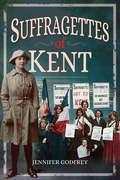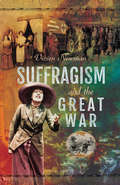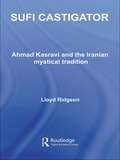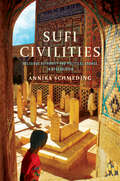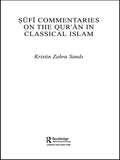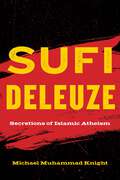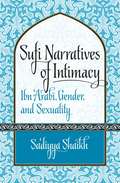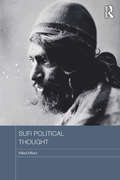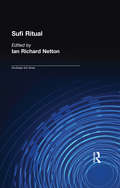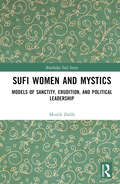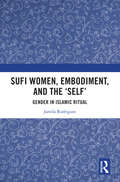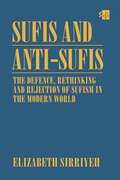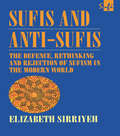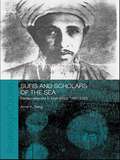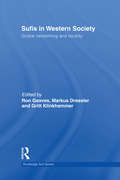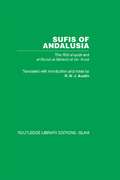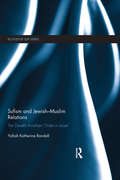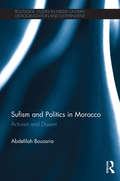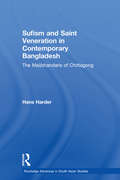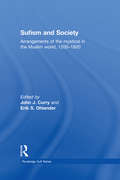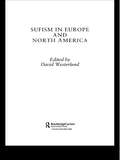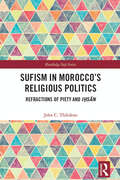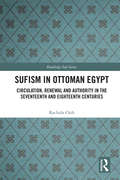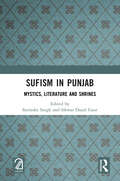- Table View
- List View
Suffragettes of Kent
by Jennifer GodfreyA thought-provoking insight into the stories of hope, determination, courage and sacrifice of those involved in the women&’s suffrage movement in Kent. Discover an untold story of a young working-class Kent maid involved in the suffrage movement. See photographs of Ethel and learn of her arrest and imprisonment in March 1912 for participating in the window-smashing militant action. The 1908 Women&’s Freedom League and the 1913 Women&’s Social and Political Union tours of Kent are retraced, their messages and the Kent inhabitants&’ reactions explored. Details are included of Kent&’s involvement in the National Union of Women&’s Suffrage Societies&’ mass pilgrimage from all parts of the country to London in 1913. Revealing the part Maidstone Gaol played in forcible feeding of suffragette prisoners the book includes an account written by the gaol&’s lead medical man. The many links between national suffrage movement leaders and pioneers and Kent are included in accounts of the visits, speeches and actions of Charlotte Despard, Emmeline Pankhurst, Annie Kenney, Emily Wilding Davison and Millicent Fawcett. Discover who was imprisoned in Maidstone Gaol, which pioneer was stoned by a Kent audience during her speech, who interrupted a Kent Liberal meeting in Tunbridge Wells, which woman challenged their Kent audience to do more for the cause and who was much celebrated on her visit to a Kent seaside town. &“Vivid accounts of the abuse of and hardships experienced by the suffragette movement in the county of Kent. One of the most moving histories of the movement in Pen and Sword&’s brilliant series.&” —Books Monthly
Suffragettes of Kent
by Jennifer GodfreyA thought-provoking insight into the stories of hope, determination, courage and sacrifice of those involved in the women&’s suffrage movement in Kent. Discover an untold story of a young working-class Kent maid involved in the suffrage movement. See photographs of Ethel and learn of her arrest and imprisonment in March 1912 for participating in the window-smashing militant action. The 1908 Women&’s Freedom League and the 1913 Women&’s Social and Political Union tours of Kent are retraced, their messages and the Kent inhabitants&’ reactions explored. Details are included of Kent&’s involvement in the National Union of Women&’s Suffrage Societies&’ mass pilgrimage from all parts of the country to London in 1913. Revealing the part Maidstone Gaol played in forcible feeding of suffragette prisoners the book includes an account written by the gaol&’s lead medical man. The many links between national suffrage movement leaders and pioneers and Kent are included in accounts of the visits, speeches and actions of Charlotte Despard, Emmeline Pankhurst, Annie Kenney, Emily Wilding Davison and Millicent Fawcett. Discover who was imprisoned in Maidstone Gaol, which pioneer was stoned by a Kent audience during her speech, who interrupted a Kent Liberal meeting in Tunbridge Wells, which woman challenged their Kent audience to do more for the cause and who was much celebrated on her visit to a Kent seaside town. &“Vivid accounts of the abuse of and hardships experienced by the suffragette movement in the county of Kent. One of the most moving histories of the movement in Pen and Sword&’s brilliant series.&” —Books Monthly
Suffragism and the Great War
by Vivien NewmanJoin Dr Vivien Newman, arm in arm, with some of the formidable women of the pre-First World War suffrage and anti-suffrage movements as, on the declaration of war, they turn their considerable skills, honed over 50 years of active campaigning, to both support of the war and the pursuit of peace.Get to know how these women could bend politicians' wills to their own, challenge and break the many role-norms of contemporary patriarchal society, raise hundreds of thousands of pounds in voluntary contributions and help convince the US public to join the Allied Cause.This book explodes many myths, including the simplistic idea that it was women's war service alone which led to their partial enfranchisement in 1918 as some form of reward from a grateful nation.Vivien Newman reveals a social tapestry which is both complex and infinitely fascinating, one of old friendships broken and new ones formed, shifting alliances and bitter rivalries, of loyalties and even betrayals.
Sufi Castigator: Ahmad Kasravi and the Iranian Mystical Tradition (Routledge Sufi Series #Vol. 19)
by Lloyd RidgeonSufi Castigator investigates the writings of Ahmad Kasravi, one of the foremost intellectuals in Iran. It studies his work within the context of Sufism in modern Iran and mystical Persian literature and includes translations of Kasravi’s writings. Kasravi provides a fascinating topic for those with interests in Sufism and Iranian studies as he attempted to produce a form of Iranian identity that he believed was compatible with the modern age and Iranian nationalism. His stress on reason and the de-mystification of religion caused him to repudiate Sufism and much of the Sufi literary heritage as backwards and believed it a reason for the weakness of modern Iran. Kasravi’s historical observations were weak, and his writings indicate that he was working towards pre-determined conclusions. However, his works are of significance because they contributed to a major discussion in the 1930s to 1940s about the ideal image and identity that Iranians should adopt. Despite the academic weaknesses of Kasravi’s works he had a profound effect on the next generation of thinkers. Sufi Castigator is stimulating and meticulously researched book and includes two lengthy translations of Kasravi’s works, Sufism and What does Hafez Say? and will appeal to scholars of middle eastern studies.
Sufi Civilities: Religious Authority and Political Change in Afghanistan
by Annika SchmedingDespite its pervasive reputation as a place of religious extremes and war, Afghanistan has a complex and varied religious landscape where elements from a broad spectrum of religious belief vie for a place in society. It is also one of the birthplaces of a widely practiced variant of Islam: Sufism. Contemporary analysts suggest that Sufism is on the decline due to war and the ideological hardening that results from societies in conflict. However, in Sufi Civilities, Annika Schmeding argues that this is far from a truthful depiction. Members of Sufi communities have worked as resistance fighters, aid workers, business people, actors, professors, and daily workers in creative and ingenious ways to keep and renew their networks of community support. Based on long-term ethnographic field research among multiple Sufi communities in different urban areas of Afghanistan, the book examines navigational strategies employed by Sufi leaders over the past four decades to weather periods of instability and persecution, showing how they adapted to changing conditions in novel ways that crafted Sufism as a force in the civil sphere. This book offers a rare on-the-ground view into how Sufi leaders react to moments of transition within a highly insecure environment, and how humanity shines through the darkness during times of turmoil.
Sufi Commentaries on the Qur'an in Classical Islam (Routledge Studies in the Qur'an)
by Kristin SandsMeeting the ever increasing interest in Islam and Sufism, this book is the first comprehensive study of Sufi Qur’anic commentaries and includes translations of many writings previously unavailable in English. It examines the shared hermeneutical assumptions of Sufi writers and the diversity in style of Sufi commentaries. Some of the assumptions analyzed are: * the Qur’an is a multi-layered and ambiguous text open to endless interpretation * the knowledge of deeper meanings of the Qur’an is attainable by means other than transmitted interpretations and rational thought * the self is dynamic, moving through states and stations which result in different interpretations at different times. The styles of Sufi commentaries are explored, which range from philosophical musings to popular preaching to literary narrative and poetry. Other commentaries from the classical period are also investigated to provide context in understanding Sufi approaches and exegetical styles.
Sufi Deleuze: Secretions of Islamic Atheism
by Michael Muhammad Knight“There is always an atheism to be extracted from a religion,” Deleuze and Guattari write in their final collaboration, What Is Philosophy? Their claim that Christianity “secretes” atheism “more than any other religion,” however, reflects the limits of their archive. Theological projects seeking to engage Deleuze remain embedded within Christian theologies and intellectual histories; whether they embrace, resist, or negotiate with Deleuze’s atheism, the atheism in question remains one extracted from Christian theology, a Christian atheism. In Sufi Deleuze, Michael Muhammad Knight offers an intervention, engaging Deleuzian questions and themes from within Islamic tradition. Even if Deleuze did not think of himself as a theologian, Knight argues, to place Deleuze in conversation with Islam is a project of comparative theology and faces the challenge of any comparative theology: It seemingly demands that complex, internally diverse traditions can speak as coherent, monolithic wholes. To start from such a place would not only defy Islam’s historical multiplicity but also betray Deleuze’s model of the assemblage, which requires attention to not only the organizing and stabilizing tendencies within a structure but also the points at which a structure resists organization, its internal heterogeneity, and unpredictable “lines of flight.”A Deleuzian approach to Islamic theology would first have to affirm that there is no such thing as a universal “Islamic theology” that can speak for all Muslims in all historical settings, but rather a multiplicity of power struggles between major and minor forces that contest each other over authenticity, authority, and the making of “orthodoxy.” The discussions in Sufi Deleuze thus highlight Islam’s extraordinary range of possibilities, not only making use of canonically privileged materials such as the Qur’an and major hadith collections, but also exploring a variety of marginalized resources found throughout Islam that challenge the notion of a singular “mainstream” interpretive tradition. To say it in Deleuze’s vocabulary, Islam is a rhizome.
Sufi Narratives of Intimacy
by Sa'Diyya ShaikhThirteenth-century Sufi poet, mystic, and legal scholar Muhyi al-Din ibn al-'Arabi gave deep and sustained attention to gender as integral to questions of human existence and moral personhood. Reading his works through a critical feminist lens, Sa'diyya Shaikh opens fertile spaces in which new and creative encounters with gender justice in Islam can take place. Grounding her work in Islamic epistemology, Shaikh attends to the ways in which Sufi metaphysics and theology might allow for fundamental shifts in Islamic gender ethics and legal formulations, addressing wide-ranging contemporary challenges including questions of women's rights in marriage and divorce, the politics of veiling, and women's leadership of ritual prayer. Shaikh deftly deconstructs traditional binaries between the spiritual and the political, private conceptions of spiritual development and public notions of social justice, and the realms of inner refinement and those of communal virtue. Drawing on the treasured works of Sufism, Shaikh raises a number of critical questions about the nature of selfhood, subjectivity, spirituality, and society to contribute richly to the prospects of Islamic feminism as well as feminist ethics more broadly.
Sufi Political Thought (Routledge Religion in Contemporary Asia Series)
by Milad MilaniSufism is generally perceived as being spiritually focused and about the development of the self. However, Sufi orders have been involved historically as important civic and political actors in the Muslim world, having participated extensively in inter-faith dialogue and political challenges to religious orthodoxy. This book presents a comprehensive overview of the Sufi political tradition, both historically and in its present form. It outlines how Sufi thought has developed, examines how Sufism has been presented both by scholars and by Sufis themselves, and considers Sufis’ active political roles. It argues that Sufis – frequently well educated, well travelled and imaginative – have been well placed to engage with other faiths and absorb their ideas into Islam; but that they have also been, because they understand other faiths, well placed to understand the distinctiveness of Islam, and thereby act as the guardians of Islam’s core ideas and values.
Sufi Ritual: The Parallel Universe (Routledge Sufi Series)
by Ian Richard NettonThis study reveals the world of Sufi ritual with particular reference to two major Sufi orders. It examines the ritual and practices of these orders and surveys their organisation and hierarchy, initiation ceremonies, and aspects of their liturgy such as dhikr (litany) and sama (mystical concert). Comparisons are made with the five pillars of Islam (arkan), and the Sufi rituals, together with the arkan, are examined from the perspective of theology, phenomenology, anthropology and semiotics. The work concludes with an examination of the Sufi in the context of alienation. This is a major work which highlights the importance of Sufi ritual and locates it within the broader domain of the Islamic world.
Sufi Women and Mystics: Models of Sanctity, Erudition, and Political Leadership (Routledge Sufi Series)
by Minlib DallhThis book focuses on women’s important contribution to Sufism by analysing the lives and seminal contributions of six mystic Sufi women to Islamic spirituality. To help reverse the sidelining of Sufi women in the recorded academic literature, the author has selected a representative sample of figures from diverse Islamic dynasties with varying backgrounds, social status, and devotional contributions. Taking a historical approach attentive to specific political contexts, readers will be introduced to the contributions of Umm Ali al-Balkhi and Fātima of Nishāpūr in the ninth-century Khurāsān, Aisha al-Mannūbiyya of the Hafsid dynasty in Afriqya, Aisha al-Bā‘únīyya of the Mamlūk dynasties of Egypt and Syria, the Mughal princess Jahan Ara Begum, and the daughter of the Caliph of Sokoto, Nana Asma’u. It is argued that these ascetic and Sufi women were recognized by their male and female peers, became political leaders in their communities, and were honored as examples of sanctity and erudition. Their works influenced mystical discourse, hagiographical writings, religious language and models of religious authority to secure legacies of Islamic orthopraxis. The book will appeal to anyone interested in Sufism and Sufi history, as well as to those wishing to delve into the understudied topic of Muslim women’s spirituality.
Sufi Women, Embodiment, and the ‘Self’: Gender in Islamic Ritual
by Jamila RodriguesThis book is an ethnographic case study of Sufi ritual practice and embodied experience amongst female members of the Naqshbandi community. Drawing on fieldwork in Cape Town, South Africa, and Lefke, Cyprus (2013/2014), the author examines women’s experiences within a particular performance of Sufi tradition. The focus is on the ritual named hadra, involving the recital of sacred texts, music, and body movement, where the goal is for the individual to reach a state of intimacy with God. The volume considers Sufi practice as a form of embodied cultural behavior, religious identity, and selfhood construction. It explains how Muslim women’s participation in hadra ritual life reflects religious and cultural ideas about the body, the body’s movement, and embodied selfhood expression within the ritual experience. Sufi Women, Ritual Embodiment and the ‘Self’ engages with studies in Sufism, symbolic anthropology, ethnography, dance, and somatic studies. Contributing to discussions of religion, gender, and the body, the book will be of interest to scholars from anthropology, sociology, religious ritual studies, Sufism and gender studies, and performance studies.
Sufis and Anti-Sufis: The Defence,
by Elizabeth SirriyehDespite its continuing appeal in the Muslim world, Sufism has faced fierce challenges in the last 250 years. This volume assesses the evolution of anti-Sufism since the middle of the eighteenth century and Sufi strategies for survival.
Sufis and Anti-Sufis: The Defence, Rethinking and Rejection of Sufism in the Modern World (Routledge Sufi Series)
by Elizabeth SirriyehDespite its continuing appeal in the Muslim world, Sufism has faced fierce challenges in the last 250 years. This volume assesses the evolution of anti-Sufism since the middle of the eighteenth century and Sufi strategies for survival. It also considers the efforts of a few significant Muslim intellectuals to contemplate a future for a mystical approach to Islam without traditional Sufism. Many studies of Islam in the modern period have focused on the attempts of Muslim 'modernists' or 'fundamentalists' to come to terms with western modernity, and Sufis have often been marginalised in the process. Elizabeth Sirriyeh redresses this neglect by assigning to Sufism a central place in the broader history of Islam in the modern world and by examining how changing understandings of Sufism's role in modern conditions have affected Muslims of all shades of opinion.
Sufis and Scholars of the Sea: Family Networks in East Africa, 1860-1925 (Routledge Indian Ocean Series)
by Anne BangAnne Bang focuses on the ways in which a particular Islamic brotherhood, or 'tariqa', the tariqa Alawiyya, spread, maintained and propagated their particular brand of the Islamic faith. Originating in the South-Yemeni region of Hadramawt, the Alawi tariqa mainly spread along the coast of the Indian Ocean. The Alawis are here portrayed as one of many cultural mediators in the multi-ethnic, multi-religious Indian Ocean world in the era of European colonialism.
Sufis in Western Society: Global networking and locality (Routledge Sufi Series)
by Ron Geaves Markus Dressler Gritt KlinkhammerIn recent years Sufism has undergone something of a revival as a spiritual alternative to other manifestations of Islam. This book investigates the development of Sufism in Western societies, with a regional focus on North America and Europe. Exploring a number of issues relating to the dynamic tensions between religious globalization processes and specific sacred localities, this book looks at the formation of Sufi movements that have migrated from their place of origin to become global religious networks. Sufi groups are highly differentiated and often inaccessible, so the origins and development of Sufism in the West have not been widely studied. Employing a comparative approach based on regional fieldwork and case studies, this book addresses theoretical issues and gives a comprehensive analysis of distinct communities and the development of regional branches of Sufi orders, providing an international perspective on Sufism in the West. With contributions from well-known international experts on the topic, the book addresses Sufi orders in the context of the transnational networks in which they are operating and the constraints of the localities in which they live. This book will be of interest to scholars and students of religion, Islam and Sufism in particular.
Sufis of Andalucia: The Ruh al-Quds and Al-Durat Fakhirah (Routledge Library Editions: Islam)
by M. Ibn 'ArabiSufis of Andalusia consists of biographical sketches of some of the contemplatives and spiritual masters among whom Ibn 'Arabi spent his early years.
Sufism and Jewish-Muslim Relations: The Derekh Avraham Order in Israel (Routledge Sufi Series)
by Yafia Katherine RandallIn Israel there are Jews and Muslims who practice Sufism together. The Sufi’ activities that they take part in together create pathways of engagement between two faith traditions in a geographical area beset by conflict. Sufism and Jewish Muslim Relations investigates this practice of Sufism among Jews and Muslims in Israel and examines their potential to contribute to peace in the area. It is an original approach to the study of reconciliation, situating the activities of groups that are not explicitly acting for peace within the wider context of grass-roots peace initiatives. The author conducted in-depth interviews with those practicing Sufism in Israel, and these are both collected in an appendix and used throughout the work to analyse the approaches of individuals to Sufism and the challenges they face. It finds that participants understand encounters between Muslim and Jewish mystics in the medieval Middle East as a common heritage to Jews and Muslims practising Sufism together today, and it explores how those of different faiths see no dissonance in the adoption of Sufi practices to pursue a path of spiritual progression. The first examination of the Derekh Avraham Jewish-Sūfī Order, this is a valuable resource for students and scholars of Sufi studies, as well as those interested in Jewish-Muslim relations.
Sufism and Politics in Morocco: Activism and Dissent (Routledge Studies in Middle Eastern Democratization and Government)
by Abdelilah BouasriaPresenting a political history and sociology of Moroccan Sufism from colonialism to the modern day, this book studies the Sufi model of Master and Disciple in relation to social and political life, comparing the different eras of acquiescent versus dissident Sufism. This comparative fieldwork study offers new perspectives on the connection between the monarchy and mystic realms with a specific coverage of the Boutchichi order and Abdessalam Yassine’s Al Adl Wal Ihsane, examining the myth of apolitical Sufism throughout the Middle East and North Africa. Drawing on Michel Foucault and James Scott, this book fuses thinking about the political dimension of Sufism, a "hidden transcript," involving power struggles, patronage and justice and its esoteric spiritual ethics of care. Addressing the lacuna in English language literature on the Boutchichi Sufi order in Morocco, this book will be of interest to students and scholars of Islamic Studies, Comparative Politics and the MENA region.
Sufism and Saint Veneration in Contemporary Bangladesh: The Maijbhandaris of Chittagong (Routledge Advances in South Asian Studies)
by Hans HarderFocusing on the Maijbhandari movement in Chittagong, south-eastern Bangladesh, which claims the status of the only Sufi order originated in Bengal and which has gained immense popularity in recent years, this book provides a comprehensive picture of an important aspect of contemporary Bengali Islam in the South Asian context. Expertise in South Asian languages and literatures is combined with ethnographic field work and theoretical formulations from a range of disciplines, including cultural anthropology, Islamic studies and religious studies. Analysing the Maijbhandaris tradition of Bengali spiritual songs, one of the largest popular song traditions in Bengal, the book presents an in-depth study of Bengali Sufi theology, hagiography and Maijbhandari esoteric songs, as well as a discussion of what Bengali Islam is. It is a useful contribution to South Asia Studies, as well as Islamic Studies.
Sufism and Society: Arrangements of the Mystical in the Muslim World, 1200–1800 (Routledge Sufi Series)
by John J. Curry Erik S. OhlanderIn recent years, many historians of Islamic mysticism have been grappling in sophisticated ways with the difficulties of essentialism. Reconceptualising the study of Islamic mysticism during an under-researched period of its history, this book examines the relationship between Sufism and society in the Muslim world, from the fall of the Abbasid caliphate to the heyday of the great Ottoman, Mughal and Safavid empires. Treating a heretofore under-researched period in the history of Sufism, this work establishes previously unimagined trajectories for the study of mystical movements as social actors of real historical consequence. Thematically organized, the book includes case studies drawn from the Middle Eastern, Turkic, Persian and South Asian regions by a group of scholars whose collective expertise ranges widely across different historical, geographical, and linguistic landscapes. Chapters theorise why, how, and to what ends we might reconceptualise some of the basic methodologies, assumptions, categories of thought, and interpretative paradigms which have heretofore shaped treatments of Islamic mysticism and its role in the social, cultural and political history of pre-modern Muslim societies. Proposing novel and revisionist treatments of the subject based on the examination of many under-utilized sources, the book draws on a number of disciplinary perspectives and methodological approaches, from art history to religious studies. As such, it will appeal to students and scholars of Middle East studies, religious history, Islamic studies and Sufism.
Sufism in Europe and North America
by David WesterlundToday there is a substantial and rapidly growing Muslim population in Europe and North America. Here, as elsewhere, many of the Muslims are Sufis. This book focuses mainly on issues of inculturation or contextualization of Sufism in the West. It shows that, while more traditional forms of Sufism exist, many radical changes have taken place in this part of the world. For instance, in some groups there are female sheikhs and a far-reaching pluralistic attitude to other religions. Hence Sufism is sometimes seen as something that transcends the boundaries of Islam.
Sufism in Morocco's Religious Politics: Refractions of Piety and Iḥsān (Routledge Sufi Series)
by John C. ThibdeauThis book outlines the role of Sufism in Moroccan politics in the twenty-first century through a comparative study of contemporary Sufi organizations. The author begins his analysis by highlighting the strategies employed by the Moroccan state over the past twenty years, aimed at regulating and producing an authorized ‘Moroccan Islam’ in the kingdom. Despite these policies of spiritual security and spiritual diplomacy, including the state sponsorship of Sufi organizations, the author argues that this has not decreased diversity nor produced a banal interpretation of Islam, but rather given rise to diverse articulations and performances of this religiosity. Through a comparative analysis of three Sufi organizations based on eighteen months of fieldwork – two of which have never before been studied – the author brings into relief the spaces of creative enactment of Sufism as an ethical tradition. Ultimately, it is argued that each Sufi organization reflects a different refraction of iḥsān, a concept emphasising the cultivation of public piety which underpins the Moroccan state’s formulation of Islam. Focused on both theoretical contributions to Islamic studies and topical treatments of geopolitical issues like spiritual diplomacy, the Western Sahara, and Morocco-Algeria, the book spans multiple disciplines, including anthropology, religious studies, sociology, and political science.
Sufism in Ottoman Egypt: Circulation, Renewal and Authority in the Seventeenth and Eighteenth Centuries (Routledge Sufi Series)
by Rachida ChihThis book analyses the development of Sufism in Ottoman Egypt, during the seventeenth and eighteenth centuries. Examining the cultural, socio-economic and political backdrop against which Sufism gained prominence, it looks at its influence in both the institutions for religious learning and popular piety. The study seeks to broaden the observed space of Sufism in Ottoman Egypt by placing it within its imperial and international context, highlighting on one hand the specificities of Egyptian Sufism, and on the other the links that it maintained with other spiritual traditions that influenced it. Studying Sufism as a global phenomenon, taking into account its religious, cultural, social and political dimensions, this book also focuses on the education of the increasing number of aspirants on the Sufi path, as well as on the social and political role of the Sufi masters in a period of constant and often violent political upheaval. It ultimately argues that, starting in medieval times, Egypt was simultaneously attracting foreign scholars inward and transmitting ideas outward, but these exchanges intensified during the seventeenth and eighteenth centuries as a result of the new imperial context in which the country and its people found themselves. Hence, this book demonstrates that the concept of ‘neosufism’ should be dispensed with and that the Ottoman period in no way constituted a time of decline for religious culture, or the beginning of a normative and fundamentalist Islam. Sufism in Ottoman Egypt provides a valuable contribution to the new historiographical approach to the period, challenging the prevailing teleology. As such, it will prove useful to students and scholars of Islam, Sufism and religious history, as well as Middle Eastern history more generally.
Sufism in Punjab: Mystics, Literature and Shrines
by Surinder Singh Ishwar Dayal GaurThis anthology is a collective endeavor of scholars from India and Pakistan devoted to Sufi mystics, literature and shrines with a detailed introduction. The essays explore the methods adopted by the Punjab Sufis to popularize the mystic ideology and praxis in the medieval socio-cultural milieu. These writings also delve into the different genres of Sufi literature, both in the elite and vernacular languages, intending to appreciate the nuances of Punjab Sufism. Apart from the architectural features of the Sufi shrines, the anthology attempts to illumine the organic linkages between these institutions and the Punjabis and, thus, underscore the Sufi non-communitarian devotion as a primary ingredient of the Punjabi cultural fusion. This title is co-published with Aakar Books. Print editions not for sale in South Asia (India, Sri Lanka, Nepal, Bangladesh, Pakistan and Bhutan)
